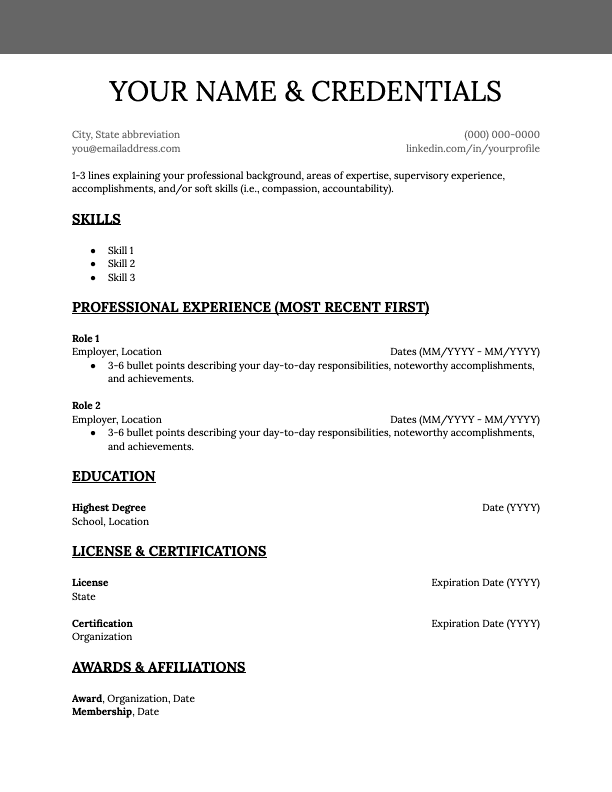A resume or CV often serves as an organization’s first impression of you. In fact, a resume tells the recruiter or hiring manager objective information about you which can be used to decide if an interview is the next step. For this reason, your resume should be professionally communicate the most important information about yourself, so that the reviewer can make the right decision. No two resumes are the same, but there are some guiding principles that you can follow. Even with nurses in high demand, you still need a well present nursing resume to stand out from other applicants. A strong resume consist your skills and experience and how they fit an employer’s needs.
Therefore, learn to make the best possible impression through this collection of resume writing tips for nurses.
What do nurses do?
Registered nurses (RNs) are typically involved in providing and coordinating patient care, while also playing an important role in educating patients and the public about diverse health conditions. They work in a wide variety of health care settings, including hospitals, physicians’ offices, home healthcare services, and nursing care facilities, as well as outpatient clinics and schools.
According to the U.S. Bureau of Labor Statistics (BLS), the median annual wage for registered nurses was $75,330 in May 2023. The lowest 10% earned less than $53,410, and the highest 10% more than $116,230.
What’s the best resume format for a nurse?
Visual structure contains character on your CV. Consider how your resume layout, design and formatting could project attentiveness or a focus on details and a certain measure of discipline.
A template can help you achieve this without looking too cold or rigidly formal (like the resume of a lawyer or auditor, for example). The Resume.io collection has a wide variety of resume styles to choose from, including those with the perfect balance of “disciplined” and “emotional.” We suggest the Paris, New York, Stockholm, and Santiago templates as a great fit for a nurse resume.
These templates can also protect you from being unwittingly sabotaged by formatting that may not translate well to electronic systems, or that is not readable at all.
What Are The Best Tips for Nurse Resume Writing:
These tips on writing a powerful nursing resume can help you stand out in a crowded pool of applicants. Recruiters spend an average of seven seconds on each resume, and you can make those seconds count for you.
1.Tailor Your Resume.
Writing an effective nursing resume requires taking your prospective employer’s applicant requirements into careful consideration. Every hospital operates with its own culture and philosophy. Consult the organization’s website and social media presence to get an idea of what their goals and points of emphasis are. This shows the employer, that you understand their workplace. Also this will allow you to communicate how you can help them achieve their goals.

2. Be Specific
Specificity can boost a resume. For example, while both positions require a great deal of stamina, a nursing home nurse does not fulfill the same responsibilities as an urgent care nurse. By framing professional experience through a personal lens, your resume will stands out among the others.
What conditions or diseases do you treat? What types of medication can you administer and how? How about types of therapy and equipment you specialize in?
When describing duties, use action verbs (supervised, administered, collaborated) and positive adjectives (resilient, compassionate, observant) that reflect your dedication to patient care and organizational success. Quantify your impact by describing how you improved patient outcomes or organizational efficiency.
3. Save Your Resume under a Professional Name
Remember that useful specificity is the goal. Instead of attaching a vaguely titled document, name your nursing resume so that employers can easily distinguish and retrieve it, such as “Firstlast_specialty_resume.doc.” Be sure to check your document’s metadata and edit it properly.
4. Make It Easy to Read
Although interesting fonts and attractive colors can make a nursing resume appear more interesting, they can also detract from the information. Employers may also perceive excessive formatting as an overcompensation for lack of qualifications.
You should strive for accessibility through logical placement and uniformity. Start with the most important information and make it the most prestige.
5. Include a Cover Letter
Employers recognize you cannot fit all your credentials and qualifications into a resume without it becoming very difficult to understand. A cover letter offers you the chance to discuss your skills and achievements in greater detail. This is also a good place to describe how you would be a good cultural fit with the firm.
6. Keep It to One Page
Nurses, particularly those with less than 10 years of relevant professional experience, do not need more than one page to respond to a job listing. Abstain from wordiness, relying instead on economical usage of resume structure, including margin manipulations and concise usage of action-oriented descriptions.
These tips can help make your nursing resume easy to read, especially for a busy recruiter. As you take these resume writing tips into account, be sure to avoid common mistakes.
Common Mistakes Nurses Make on Their Resumes.
Because nursing requires attention to detail, mistakes on a nursing resume can leave a bad first impression. The following list includes some of these oversights.
. Typos:
Easy to fix but often overlooked, these mistakes can cost you to loss an interview. Most employers see typos as a candidate’s lack of professionalism and competency. Edit your writing for errors and inconsistencies. Don’t rely solely on an online spell-checker, since many only flag misspelled words, not if the word is misused.
. Including Personal Information:
Include your full name, phone number, and professional email. You do not need to supply a home address, city, state, or country. Presenting a nursing licensure type and number from the start helps employers differentiate you from unqualified candidates.
. Including Salary Information:
Unless the employer penalizes former salary omission, do not include a salary. This may distract your qualifications and impede you during the interview and subsequent negotiations. If pushed, speak in terms of benefits and professional goals, ensuring the employer that you are flexible in your expectations.
. Using Nicknames:
Standard usage allows the shortened version of a name (Bill instead of William) or a middle name as a first name as long as you are consistent, especially if this nickname appears on official documents, such as state identification.
. Using an Unprofessional Email Address:
While a Gmail address with a variation on “firstname.lastname” is marginally acceptable, some employers still see it as unprofessional. You can easily avoid this mistake by applying for your own domain name.
. First Person Pronouns:
Do not waste valuable resume space by repeating “I.” The reader understands you speak through the narrative voice, so first person pronouns are redundant. Structure your sentences in declarative, action-oriented statements that reflect your professional character and achievements.
. Unprofessional Voicemail:
An effective voicemail must be concise (under 25 seconds) and courteous in tone. Besides your name and a welcome statement, let the caller know when they can expect a response from you.
. Check Your Social Media Presence:
Employers check social media and anything that suggests that you might have questionable personal judgment can be a red flag. Avoid references to heavy drinking, partying, or ever mentioning patients negatively.
Examples of Nursing Resumes
Nursing resumes are typically chronological, functional, or a combination of the two. Whichever one you pick should depend on the job and the format that best demonstrates your skill set. For your first job, a functional or combination resume that lists your skills will likely be most effective, while chronological or combination resumes are better suited for jobs requiring experience.
Reverse Chronological Resume
A reverse chronological resume usually lists your most recent job first. If your most recent job is not relevant, then a functional resume may be better. This reverse chronological example for a nurse manager position shows both that the applicant holds the desired experience and that the applicant achieved important objectives. Similarly, this ER reverse chronological nursing resume example uses the kinds of key terms an automated review system may recognize.
Reverse Chronological Resume Example

Combination Resume
This combination nursing resume for a new nurse starts by listing skills and credentials so that the employer first sees how your training has prepared you. This method clarifies that you have some nursing experience, but allows the employer to first see your skill sets.
Combination Resume Example

Functional Resume
This guide to writing a CNA resume provides examples of the types of skills you can use for a functional resume. This is especially valuable if your most recent position isn’t a good match for the one you’re applying for. Similarly, if you’ve worked multiple positions in a short period of time (for example, as a travel nurse), listing each individual position you’ve recently held would take up space without showing your value as well as a cumulative list of your skills would.
Functional Resume Example

Resume layout and formatting: First impressions.
Note, the visual appearance of your nurse resume is what employers will notice first about your job application. That makes it the first impression they will have about you. A messy, cluttered resume format, or a poorly organized CV layout that lacks clearly defined sections may hurt your chances of being considered for an amazing professional nurse opportunity.
In conclusion.
it is very important to know that a strong and professional CV is what will qualified you for a nursing job opportunity. However, it also important to note, the two important factors in writing an effective nurse resume. The first is your perception, which is where you present yourself as a caring and warm nurse not one who comes across as cold and detached.
Secondly, the next factor comes backs to the ATS algorithm for scoring your resume based on keywords. Although not every Hospital uses scoring filters, but it is better to be on the safer side and not risk, having your CV to be overlooked on purely technical grounds.
